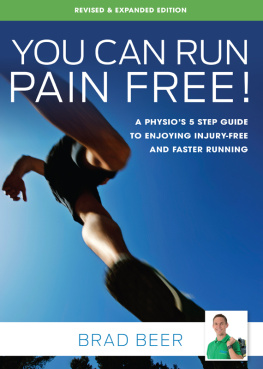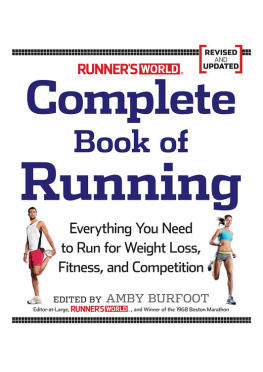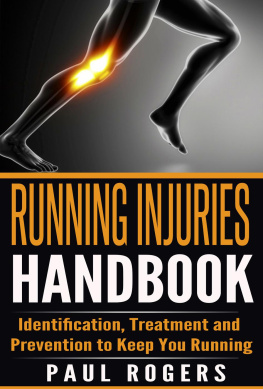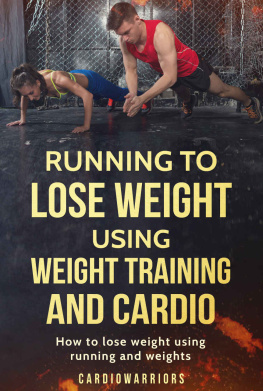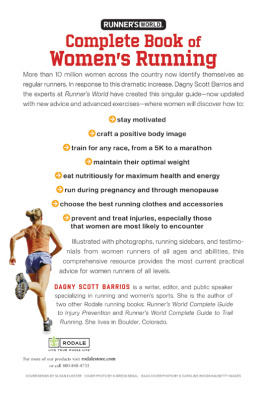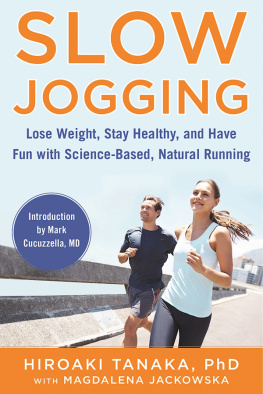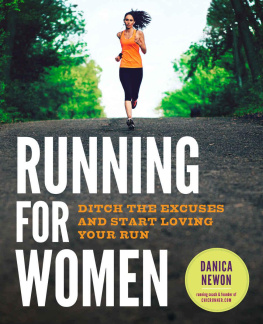The information in this book is meant to supplement, not replace, proper exercise training. All forms of exercise pose some inherent risks. The editors and publisher advise readers to take full responsibility for their safety and know their limits. Before practicing the exercises in this book, be sure that your equipment is well-maintained, and do not take risks beyond your level of experience, aptitude, training, and fitness. The exercise and dietary programs in this book are not intended as a substitute for any exercise routine or dietary regimen that may have been prescribed by your doctor. As with all exercise and dietary programs, you should get your doctors approval before beginning.
Mention of specific companies, organizations, or authorities in this book does not imply endorsement by the author or publisher, nor does mention of specific companies, organizations, or authorities imply that they endorse this book, its author, or the publisher.
Internet addresses and telephone numbers given in this book were accurate at the time it went to press.
2014 by Rodale Inc.
Photographs 2014 by Rodale Inc.
All rights reserved. No part of this publication may be reproduced or transmitted in any form or by any means, electronic or mechanical, including photocopying, recording, or any other information storage and retrieval system, without the written permission of the publisher.
Runners World is a registered trademark of Rodale Inc.
Photographs by Mitch Mandel/Rodale Images
Book design by Elizabeth Neal
Library of Congress Cataloging-in-Publication Data is on file with the publisher.
eISBN: 9781609615383

We inspire and enable people to improve their lives and the world around them.
rodalebooks.com
Dedicated to all the readers who have yet to take their first steps but will soon be a part of the running community
CONTENTS
FOREWORD
BY AMBY BURFOOT
The old Chinese proverb got it right: The journey of a thousand miles begins with a single step. Rarely is this more true than when you start a beginning-running program.
T he journey might be long and it might be arduous. So many things depend on your starting point, particularly your age, your fitness, and your weight. Theres no reason to claim that this will be easy as pie, an instant makeover, or a 10-minute miracle. It probably wont.
But heres the big payoff: Nearly everyone who sticks with the program eventually reaches their goal. I wont go so far as to say Your success is guaranteed, but Ill say its about 99 percent guaranteed. Thats an important point to remember when the going gets tough. Dont give up! Because if you stick with the plan, youll reach the journeys endyour finish line.
It will take more than 1,000 steps. In fact, if youre counting, your step total will likely reach 100,000. That may seem an impossibly big number, but its notnot when you break it down into small chunks. Not when you do a little at a time, and a little more, and then a little more. A step at a time, day by day.
At any rate, youll get there. Trust me. You wont have to call yourself a beginning runner anymore. Youll be a full-fledged runner, capable of reaching whatever goals you choose next. You could easily run a few 5-K races, for example. Or you could aim higher and choose to tackle a half-marathon, the incredibly popular race distance that has become a national sensation. You could evenyes, you could, with enough preparationdecide to enter a marathon, all 26 miles, 385 yards of it.
You are the captain of your own ship, and you get to choose what course you want to follow.
Or you could remain content running 2 or 3 miles several times a week, alone or with friends, as your personal, lifetime fitness program. Millions of runners do the same. They rarely enter races. Theyre happy for the stress-relieving, health-enhancing benefits of a consistent running program.
At last count, medical experts had proven more than 30 ways that fitness running can improve your health. These range from long-established truths like the increased heart health and longevity enjoyed by consistent runners to newer and exciting exercise-health links. Sure, the high-calorie burn of running will help you achieve and maintain a healthy weight. You can buck the rising tide of obesity and diabetes that is threatening the public health in sedentary societies worldwide.
Amazingly, you might also be able to ward off dementia and Alzheimers. A few decades ago, we runners never imagined that our happy activity would stimulate the brain as much as it does the heart and the legs. Now such discoveries seem almost obvious. Exercise pushes fresh, vibrant blood to all parts of the body, the brain included, so why shouldnt all parts benefit?
Once runners worried that their pounding on the roads and trails might lead to broken bones and knee replacements. But today we realize that a modest pounding builds strong bones, while sitting (or swimming or riding on a bicycle seat) allows the bones to deteriorate. It turns out that bones are meant to support our weight, and that they grow weak and brittle when not utilized. In other words, bones are actually quite a bit like muscle. When you use them, they thrive. When you stop using them, they wither.
Similarly, while some runners develop knee arthritis, studies have shown that arthritis rates are as high or even higher among sedentary nonrunners. The knee joint and the muscles around the knee prefer activity to lack of activity. They also appreciate it when you dont force them to carry excess weight around all day long. Most runners do a good job of controlling their body weight, and this helps them avoid knee arthritis.
But I linger too long on the physical side of running. The mental story is even more powerful and much more important. While research has shown that runners generally have low rates of depression, its the flip side of the coin that I find more impressive: Running gives you more energy and self-confidence. Running teaches you that you can accomplish more than you ever imagined possible.
Its been said a million times, but never more forcefully than by Oprah Winfrey after she completed the Marine Corps Marathon in 1994. Running is the greatest metaphor for life, because you get out of it what you put into it, she said. In other words, you succeed in running when you put all your determination and self-discipline into it, and the exact same qualities will help you succeed at anything else you pursue: education, work, art, family, community, and more.
Some potential runners never make the big leap. They suffer from a crisis of confidence and an excess of excuses. These usually include: I dont have long legs, Im too heavy, Im too old, I was never a good runner in grammar school, I was never even good at baseball/basketball/football/tennis/swimming, etc.
This perspective suffers from false logic. It assumes that you need certain physical traits or skills to be a runner. Nothing could be further from the truth (unless youre trying to win the Olympics, which I doubt you are).
To succeed in running, you need only one thing: a strong mind. Yes, your legs carry you across the ground, but only after your brain tells them to. The legs are merely an appendage, and besides, theyve been supporting you for many years, so you know they are up to the physical task.


